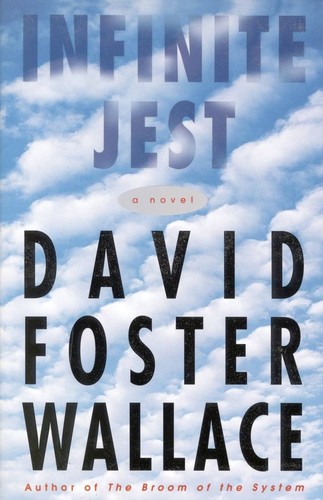kerry reviewed Infinite Jest by David Foster Wallace
Review of 'Infinite Jest' on 'Goodreads'
4 stars
If I liked Infinite Jest enough to give it 4 stars, then why did it take me almost 9 months to finish?
Some of this novel is just brilliant, and some of it went off the rails.
What's brilliant? In general, just about everything in the second half: Hal Incandenza at the "Inner Infant" meeting. Ortho Stice (yes, that's his name) stuck to the dormitory window. Don Gately in the hospital. The absurdity of the advertising industry.
I almost got defeated in the middle of the book, wondering how/if the rambling storylines were going to come together. Enough already with Remy Marathe and Hugh/Helen Steeply and the Quebec separatists. Enough with Mario Incandenza's film about the establishment of ONAN (Organization of North American Nations – Canada, US and Mexico), as enacted by puppets. Enough with Eschaton! I admit it…I started skipping text.
This is not a book to pick up and read when you have a spare 5 minutes. "Cast of thousands" may be just a slight understatement. One character "had a terrible time ever separating details from what was really important to a story." Did author DFW have this problem?
The language can be flowing and easy to read, and then suddenly turn into a swamp of goo. We get into the characters' heads with slang and vernacular ("Night Errand" for knight errant; if you "eliminate someone's map," you kill them). I was completely comfortable with shorthand ("w/r/t") and a clever use of typography to convey silence ('…'). Then there are numbing technical descriptions of the chemical composition of drugs, copyright/trademark attribution, rambling thought bubbles, and endnotes. Endnotes that point to other endnotes, even.
The book took work. After reading the last chapter, I had to re-read the first chapter to get a glimmer of understanding about what happened to Hal (the opening, it turns out, is a flash forward: it takes place after the rest of the story). Unlike with conventional novels, we never get the complete picture about several characters. (Why is Joelle veiled? What is with The Entertainment? How did Orin get into that glass cage, and will he get out? Will Hal be ok?) There's nothing wrong with working while reading; it actually felt good to put forth a mental effort. I think it's a compliment to the book that I'm still putting the pieces together, days after I finished it.
Overshadowing the entire reading experience was the fact that DFW, who suffered from depression, killed himself a few years ago. Several characters in IJ commit or contemplate suicide. During these passages, I had to wonder how much of author's voice leaked into the narration. Perhaps DFW, not Hal, is speaking these lines: "I cannot make myself understood…I am not what you see and hear."

